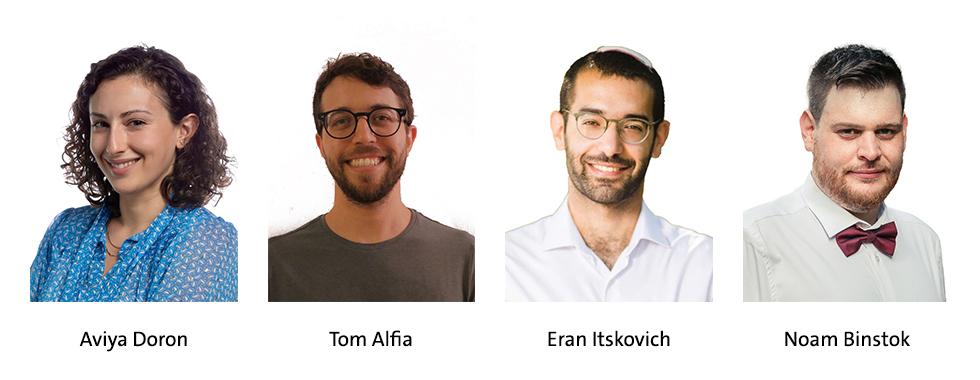SICSA is proud to announce the recipients of the Robert Wistrich Awards in the Field of Antisemitism and Racism for 2023:
Mr. Tom Alfia
Mr. Noam Binstok
Ms. Aviya Doron
Mr. Eran Itskovich

Tom Alfia is a PhD candidate in political science at the Hebrew University in Jerusalem under the supervision of Dr. Yiftah Elazar. His research, in the field of political theory, deals with the political philosophy of Hannah Arendt. Tom is supervising the online course on political existentialism in the Hebrew University titled “Hope: What Makes Us Human?”. Tom received his BA at the Hebrew University and was subsequently admitted to the Telem honors program for MA and Ph.D. in the Hebrew University’s Political Science department.
The article that won him the prize is part of his dissertation titled "Hannah Arendt and the Existential Foundations of Politics." In this article, he explicates Arendt's analysis of the totalitarian form of government for the purpose of reconstructing her framework to classify forms of government in general. He finds Arendt's analysis of totalitarianism fascinating. She claimed that at the base of totalitarian domination stands the radical and desperate experience of loneliness, felt by the masses of persons who participated, joined, or merely found legitimate, the totalitarian movements. From this radical experience of loneliness arose widespread susceptibility for ideological indoctrination – for example, the interpretation of the world in terms of an eternal racial struggle – but also the consent for, and active participation in, acts of terror. In this research, he argues that totalitarianism is unprecedented for Arendt because it is a frightening new way for people to live together: it is a shared life that is based on loneliness. The project aims at systematizing Arendt's framework for the classification of forms of government. Hopefully, such systematization would allow a renewed understanding of the different experiences persons share in their common life and an appreciation of their significance for political forms of organization.
Noam Binstok is a Ph.D. student in the Department of Economics at the Hebrew University. Under the supervision of Professor Asaf Zussman, he focuses on applied microeconomics with a particular interest in discrimination, bias, and social identity. Noam holds a B.A. in Economics and Middle Eastern Studies, as well as an M.A. in Economics, both from Hebrew University. During his studies, he gained valuable experience in intelligence gathering and analysis while working for specialized companies. His expertise in data-gathering and analysis plays a vital role in his current research pursuits.
His paper examines the extent to which personal biases affect political views, in the context of how anti-semitism influences opinions about Israel. Two empirical analyses are conducted. The first one analyzes social media chatter about Jews and Israel in the UK, revealing a strong, positive relationship between negative chatter about both of them at the daily-location level. In order to establish causality, social media chatter about a “Jewish” football team in the English Premier League (Tottenham) is used as an instrument for negative expressions about Jewish people to explain negativity towards Israel. The second empirical analysis uses the 2016 wave of the German Social Survey, which reveals a strong and robust relationship between holding anti-Israel views and several commonly used measures of anti-semitic beliefs. A causal interpretation of this finding is supported by an IV analysis motivated by Voigtländer and Voth (2015) who show that Nazi indoctrination during the WWII period had a lifelong impact on anti-semitic views. In both analyses, the IV estimates are considerably larger than OLS coefficients.
Aviya Doron is a PhD student at the Department of Jewish History at the Hebrew University of Jerusalem under the supervision of Prof. Elisheva Baumgarten. Her research explores risk and trust in Jewish-Christian economic interactions in the German Empire (1280–1420). The questions at the heart of her research are how risk was conceptualized, experienced and overcome in interreligious personal contacts, and which institutionalized mechanisms governing economic exchange helped build and sustain trust. Combining legal and administrative archival sources in Latin and German with responsa literature, her research draws on institutional economic history, social-network analysis, and the history of daily life. Identifying and understanding mechanisms for evaluating risk and building trust can shed new light on the role of economic incentives in shaping the boundaries between religious conflict and daily economic and social contacts.
Doron’s article argues that the prevalence of credit transactions, in both interreligious as well as intra-religious exchange, brought with it other forms of ethical and moral concerns for both Jews and Christians. It also examines some of Jews’ moral concerns arising from the practice of extending credit, mostly focusing on moral conceptions regarding the boundaries of competition. With Jews embedded in the legal and cultural traditions of medieval Christian society, their attitudes toward economic morality will be discussed within the wider context of Christian cultural norms.
Eran Itskovich is a Ph.D. candidate at the Institute of Criminology of the Hebrew University of Jerusalem. He received his B.A. in Sociology & Anthropology and Philosophy in 2016 and M.A. in Criminology (summa cum laude) in 2020 from the Hebrew University of Jerusalem. His research interests include wrongful convictions, the association between economic inequality and crime, and proactive policing.
Applying multilevel analysis to data from the National Registry of Exonerations in the United States, His article compares the length of the exoneration process for members of racially marginalized minority groups who are shown to have been wrongfully convicted compared with their counterparts from the white majority group. The research’s results indicate that exonerees from racially marginalized groups serve more time out of their sentence compared to those who are white. Further analysis shows that these differences exist only with respect to exonerees in Republican-controlled states. These findings suggest that not only are racially marginalized minorities wrongfully convicted at higher rates, as found in previous studies, but also that they suffer longer periods of unjustified punishment.




